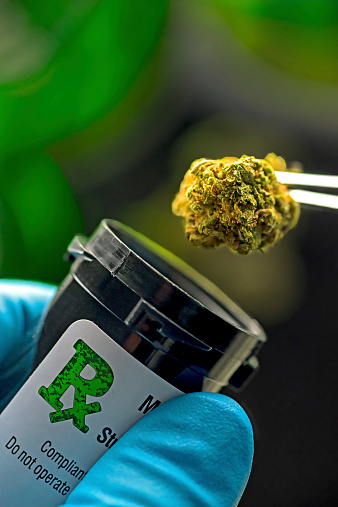Dr. Louis Bax ter, President and Executive Medical Director of the Professional Assistance Program of New Jersey and former President of the American Society of Addiction Medicine, recently spoke out with his concerns about the increasing acceptance of medical marijuana here in the United States.
ter, President and Executive Medical Director of the Professional Assistance Program of New Jersey and former President of the American Society of Addiction Medicine, recently spoke out with his concerns about the increasing acceptance of medical marijuana here in the United States.
Baxter’s concerns are directly related to an announcement from Dr. Sanjay Gupta, chief medical correspondent for CNN and assistant professor of neurosurgery at Emory University School of Medicine. Gupta, a former critic of medical marijuana, publicly recanted his opinion earlier this week in conjunction with a documentary he filmed that delved into the details of medical marijuana use.
In response, Dr. Baxter has specifically voiced concerns about the lack of peer-reviewed research supporting the viability of medical marijuana, as well as the increased potential for abuse that may arise from increased availability of marijuana.
“I am worried, primarily, because physicians have been put in the position to be gatekeepers of a substance that has not undergone any FDA approval processes,” he said in an interview on New York City’s WOR 710AM.
Other Concerns Raised By Dr. Baxter About Legalization of Medical Marijuana Use
- Potential for abuse and illicit use by minors
- Difficulties in giving instructions for administering
- Health issues linked to inhaling smoke
- The potential as a gateway drug
- Difficulty in prescribing accurate doses
- Inconclusive evidence about medicinal uses
Medical Marijuana in America
As more and more U.S. states have legalized and sold medical marijuana, it seems many negative stigmas associated with the drug have lessened. Medical marijuana is legal in 23 states and in Washington D.C., and it has been federally decriminalized – meaning dispensaries no longer have to worry about being raided.[1]
Legalization of recreational use of marijuana has also gained considerable traction, with Colorado, Washington State, Alaska, Oregon and Washington D.C. all having legalized it within the past two years. This movement has been met with some skepticism, as state legislatures try to balance the financial benefits of clearing jails of non-violent criminals and of potential revenues gained from retail sales with any potential negative consequences from legalization.
Medical marijuana is legal in 23 states and in Washington D.C., and it has been federally decriminalized – meaning dispensaries no longer have to worry about being raided.
Marijuana has been said to have high medicinal value for several conditions, though the FDA has not officially approved the plant as medicine. Part of the reason is that the FDA requires clinical trials conducted on hundreds to thousands of humans to determine the benefits and risks. Being that the plant is still illegal, these studies are difficult to conduct.[2]
Here are some of the most commonly reported potential medical uses for marijuana:
- Pain Relief: In states with medical marijuana dispensaries, the number of admissions to rehabilitation facilities for pain medication and opioid overdoses decreased 15 percent and 16 percent respectively.[3] Pain relief is the most common reason medical marijuana is used and is reported to be helpful with headaches, cancer, glaucoma or nerve pain.
- Reverse Effects of Tobacco: A 2012 study published in the Journal of the American Medical Association reported that marijuana use can actually increase lung function.[4]
- Anxiety: A 2010 study conducted at Harvard Medical School suggested that the drug’s ability to reduce anxiety may be linked to its ability to help relieve pain and suppress nausea – one of the main reasons why it is used to relieve the effects of chemotherapy.[5]
- Slows Progression of Alzheimer’s Disease: A 2006 study published in Molecular Pharmaceutics found that tetrahydrocannabinol (THC) slows the formation of amyloid plaques, which are what kill brain cells and cause Alzheimer’s disease.[6]
- Arthritis: Marijuana’s pain relieving qualities and ability to promote sleep may help people with rheumatoid arthritis. Researchers in 2011 gave patients in rheumatology units from several hospitals Sativex, a cannabinoid based pain-relieving medicine. After a two week trial period, people on the drug reported significant pain reduction and improved sleep quality compared to placebo users.[7]
The Downside of Medical Marijuana
 If all of the effects of marijuana were only medicinal and were all positive, there would be no debate as to whether it should be legal or not. The bottom line is that federally, marijuana is still considered a Schedule I drug, which means it has no recognized medical use. Smoking and having marijuana in your possession can lead to hefty fines and potential jail time.
If all of the effects of marijuana were only medicinal and were all positive, there would be no debate as to whether it should be legal or not. The bottom line is that federally, marijuana is still considered a Schedule I drug, which means it has no recognized medical use. Smoking and having marijuana in your possession can lead to hefty fines and potential jail time.
The drug has several other potential negative side effects:
- Reduced Balance and Coordination
- Addiction and Dependency
- Impaired Thinking
- Diminished Memory
- Increased Risk of Psychosis[8]
- Increased Risk of Testicular Cancer[9]
Perhaps the biggest negative to consider is the overall lack of information on its societal effects. While there appears to be several potential benefits to medical marijuana use, what negative impact will federal legalization have on our society as a whole? How will the drug interact with the still developing minds of young children?
Marijuana is already the most abused drug among teenagers, and recent surveys show an overall decrease in perceived harm by using the drug.[10] What message would legalizing it, even just medically, send to our children? Even further, as more and more children are using prescription pills non-medically and getting them from their medicine cabinets, why would this same trend not continue if medical marijuana were legalized? Do we want a nation of children to have even greater access to marijuana?
More Research is Needed
As the movement to legalize marijuana, both medically and recreationally, seems to grow stronger with each day, we applaud Dr. Baxter’s message of caution. While there appear to be some very real potential benefits to medical marijuana use, there simply isn’t enough information to determine whether the pros outweigh the cons. Marijuana use can be problematic for people of all ages and can create serious life consequences, just like any other drug.
Behavioral Health of the Palm Beaches is a national leader in drug and alcohol addiction rehabilitation. We have been committed to educating the public and our patient population about the dangers of drug use since opening in 1997. Our in-house research department conducts ongoing research on drugs and effective rehabilitation strategies. If you would like more information and education on any drug or about our innovative therapies, please contact us today.



